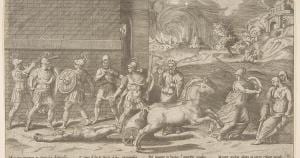Thus they tended the funeral of Hector, breaker of horses.*
 Iliad ends not as at began. The first line of the great poem, foundational to so much of Western thought, is about Achilles, the great Greek warrior, and his rage. The final line is about Hector, the dead defender of the losers of the Trojan War.
Iliad ends not as at began. The first line of the great poem, foundational to so much of Western thought, is about Achilles, the great Greek warrior, and his rage. The final line is about Hector, the dead defender of the losers of the Trojan War.
Hector is the wall of Troy and he is frequently described by his shining helmet. He is fighter, a husband, and a father, the best of King Priam’s many sons.
I would quibble with the far more brilliant translator and suggest that Hector, in this last line of this lasting poem, is a tamer not a breaker of horses, at least in the sense that most Americans will understand the word. The poem has much to say about horses: some divine animals speak and weep. Such animals are not broken, they are civilized.
The feral child is human and so must never be broken. Instead, when we find such a sad soul, we show them, slowly, and with consent, the wonders of civilization. They learn and so change, becoming what they might be and not what they were. The “is” of nature becomes the “ought” of maturity. This is the image of horses in Iliad.
Maybe, as a man with little experience of horses< I hesitate.
“Breaking” horses means a mutual relationship, I am told, to those who work with horses: they are not broken, but loved. Yet most of readers now do not have the relationship with horses that even Victorian classicists could assume in their readers. Horses are not in our lives and a broken creature is not (to us) made freer, but more our slave.
Hector made horses his companions, not broken slaves. This contrasts with another description he is given: “man slaying.” The men who go to battle in Iliad consent to do so and so they die as men, not broken beasts. They gain glory when killed by Hector, who is is the greatest by Trojans. Better to live than to die, but if die you must, then better to die at the hands of Hector, the greatest Trojan.
A great theme of Iliad is consent.
When it is missing as in the case of Chryseis, then doom falls of the Greeks. When present, then victory is nigh. The entire war against Troy is a story of consent. Did Helen agree to go with Paris? Was she forced? We are never sure, but by contrast we are sure Hector is a man of consent. He loves his wife and son. He leaves everyone better than he found them.
Hector does his duty: to his city, his wife, his son. He cannot win the war, Troy will fall, but he wins his dignity. Achilles tries to deface his body and fails. Hector, horse taming Hector, gets the last word even though dead. He has lived a life such that losing does not destroy the good he has done.
Has Hector tamed wrath? Priam certainly does in getting his body.
We often think the good man is a chump: he tells the truth, but nobody cares. Hector shows the error in this way. He does all a man can do and gets the last word. He is beaten in battle, but not in soul. Hector tames his own soul first and then looks to Troy.
We should all be Hector and not Paris!
—————————————-
*Homer, Iliad. Book XXIV. Caroline Alexander has the best translation of Iliad in English.












